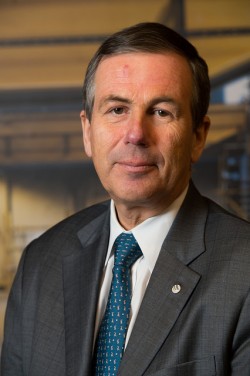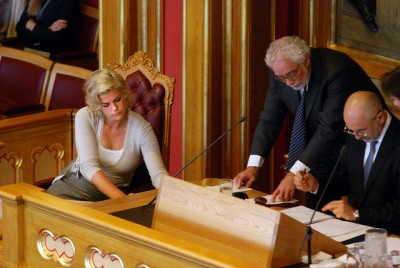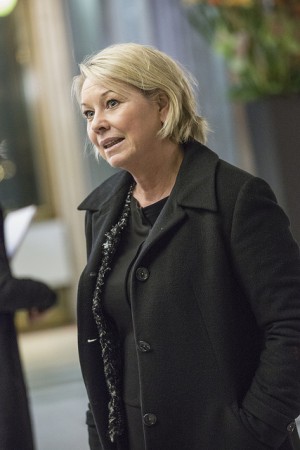Top officials of one of Norway’s largest international companies, Norsk Hydro, finally responded in detail on Monday to growing suspicions of corruption surrounding their metals trade in the former Soviet republic of Tajikistan. Without mentioning the word “corruption” in their press release, they deny having acted “in violation of any applicable laws, internal rules or guidelines.”

“Hydro has carried out internal and external reviews of the dilemmas related to this trade,” Hydro Chairman Dag Mejdell stated in the release. He claimed Hydro “has had an open dialogue on the conditions in Tajikistan” with both international organizations and Norwegian authorities.
Hydro’s chief executive Svein Richard Brandtzæg also claimed the company had “conducted an active, open and extensive dialogue with international organizations about challenges in Tajikistan and our relation with Talco (Tajikistan’s state-controlled aluminum plant) to seek advice and guidance on these challenging matters.” Mejdell stressed that “Hydro’s trade in Tajikistan has been carefully evaluated throughout,” leading the company to acquit itself of wrongdoing. Hydro officials have concluded (and repeated no less than three times in the press release attached to a report to the Norwegian government) that there were “no indications of having acted in violation of applicable laws, internal rules or guidelines.”
Despite stressing “openness and dialogue” throughout its press release, it’s the first time top company officials have recently faced reporters who’ve been raising questions about Hydro’s activity in Tajikistan for years. Tajikistan has long ranked high on the lists of countries considered to be among the most corrupt in the world.

Newspaper Dagens Næringsliv (DN) has most recently been running a series of articles about how Hydro’s trade with Tajikistan was channeled through secretive companies based in the tax havens of Guernsey and the British Virgin Islands (BVI) whose owners were kept hidden from the public. DN has reported that Hydro officials had negotiated with the authoritarian president of Tajikistan and his inner circle, and cited court documents in which the president’s family and close associates were claimed to control, directly or indirectly, the companies to which Hydro sent and received payments connected to its trade with Tajikistan.
Both Norway’s Trade Minister Monica Mæland and the parliament’s disciplinary committee had thus demanded a full account, since the state owns 34 percent of Hydro’s stock. On Monday Hydro delivered a 17-page report in which it denied having “negotiated” with Tajikistan’s president, “although we have had several meetings – also with government representatives in many countries where we operate or are engaged in trade.”
Long and troubled history in Tajikistan
The company claims in its report that Hydro has only bought and sold goods at market price and has not used “agents” or “middlemen.” It denied doing business with any entities unless it knew who owned them. The report delivered to Mæland outlines Hydro’s long and troubled history in Tajikistan that extends back to a barter contract agreed in 1993 when the country was still in a state of civil war.
It didn’t take long before Talco was “unable,” because of the war, to deliver the agreed quantity of metal (aluminum) to Hydro in return for the metal (alumina) that Hydro had delivered to it. Hydro stopped delivering metal to the plant and “hoped” that Talco would be able to pay off its debt to Hydro when the war was over. Hydro noted that it wasn’t the only aluminum customer of Talco who ended up as a creditor.
Hydro wrote about how its barter deal with Talco was eventually replaced with a new deal in 1998, after a Guernsey-registered trading company called Ansol, owned by a Tajik businessman named Avaz Nazarov, “was interested in selling Hydro metal that Ansol had bought from Talco.” Ansol, Hydro reported, had entered into a large contract both for delivery of raw material to Talco and sale of metals (aluminum) from Talco.
Companies in tax havens take over
Thus began Hydro’s dealings with companies tied to Talco that were based in tax havens and/or lacked transparency. Hydro stressed that its business in Tajikistan was constantly subjected to monitoring by various departments within Hydro, which was important because Hydro eventually became Talco’s biggest customer. “The greater the share of the aluminum plant’s production that Hydro bought, the more thorough the evaluations became,” Hydro claimed in its report signed by Mejdell. In 2003-2004, its cooperation with Talco was reviewed seven times by top management, including reviews of “the dilemmas tied to doing business in Tajikistan.”
The business came to an “abrupt halt” in 2004, when Talco stopped doing business with Ansol and Hydro. Talco “swapped” Ansol with another trading company, CDH Investment Corp, leaving Hydro with a delivery shortfall of 71,000 tons of aluminum for which it had paid. In short, Talco owed Hydro around USD 150 million, and that set off the next several years of more “dilemmas” for Hydro, as it weighed a need and desire to recoup its losses on the Talco business against having to keep doing business with a plant based in a country known for corruption and with offshore partners not known for transparency. It forged ahead with both.
Hydro writes about meetings held with its Tajik conterparts in an effort “to get Talco to fulfill its obligations,” to no avail. The dispute ultimately landed in a court of arbitration in London in which Hydro prevailed but was unable to enforce the ruling in its favour. At least three parties were now involved, with Talco arguing that Ansol was guilty of fraud, and that “Hydro knew or should have known about it.”
Trying to recoup losses
Hydro’s loss was covered by insurance, except for its deductible portion, but was obliged to keep trying to recover the loss. Negotiations then began in Tajikistan, also with Norwegian foreign ministry staff involved. Talco made it clear it was not willing to pay back the USD 150 million unless Hydro was willing to enter into new commercial contracts. Hydro expressed concern about the “lack of transparency” at Talco’s new trading firm, CDH, which refused to reveal the identities of its shareholders. Hydro disclosed that the World Bank and the European Bank for Reconstruction and Development (EBRD) had also “expressed” to Hydro that CDH should not be approved as a business partner because of the lack of transparency. Hydro said Talco then went along with replacing CDH with a new “tolling partner.”

Hydro would only accept such a new partner if there was transparency around its ownership and the owners were approved. Hydro also wanted the company to be 70 percent owned by the state and the remainder “beneficially owned by parties at arms length from the Tajik government (provided that those parties are otherwise acceptable to Hydro).”
That led to an agreement settling Hydro’s claim through a combination of payments, alumina deliveries and alumnium purchases over several years. “That’s how Hydro would recover a significant portion of its claim, approved by the court in London,” Hydro wrote to the minister. The agreement was signed in a cermony in December 2006 at the Tajik national bank and attended by representatives from the Tajik government, the Norwegian foreign ministry (then under the leadership of the current Labour Party leader Jonas Gahr Støre), the World Bank and EBRD. USD 94 million of Hydro’s claim was to be paid in cash over four years. The agreement also called for the sale and purchase of metals and technical support for Talco from Hydro.
‘Due diligence’ despite limited access to information
CDH was ultimately replaced by Talco Management Ltd (TML), registered in another tax haven (the British Virgin Islands, BVI) after a bidding round conducted over a three-week period. Hydro admits it had no insight into the bidding process but writes that the World Bank was present when bids were opened. TML was “indirectly 70 percent state-owned” through Vostokredmet (a state-owned conflomerate with 35 percent) and BarkiTojik (a state-controlled energy firm with 35 percent) while the remaining 30 percent was owned by three people: Istamullo Hayoev, Jamshed Abdulov and Maruf Orifov with 10 percent each.

Hydro claims it conducted “due diligence” on who these new owners were and could find nothing “damaging” in their background. “There was nothing to indicate any of them had been involved in or investigated for any illegal activity,” Hydro writes, but does mention that Vostokredmet had been involved in a pollution incident. Hydro also conceded that Tajikistan’s Internet was poorly developed, limiting access to information. That raises the question of just how diligent Hydro’s “due diligence” really was. Hydro also wrote in a footnote that Maruf Orifov was later convicted of corruption in Tajikistan, in 2008.
Hydro also tries, in its report Mæland, to justify its agreement to do more business with another company based in a tax haven. There were “several reasons” for TML to be registered in the British Virgin Islands, Hydro writes, mostly to “isolate cash flow and metals from legal claims from third parties.” Hydro notes it understood that “establishment in a so-called ‘tax paradise’ in general could lead to higher risk for corruption and evasion and lack of transparency,” but also that it could be an “advantage” that it was located in a place with a well-functioning court system.
“Even though Hydro primarily wanted to enter into a direct agreement with the aluminum plant (Talco),” it “accepted TML under the condition of follow-ups and measures to promote openness and transparency.” It also demanded, and won, a clause that Hydro, the World Bank and EBD would have access to TML’s annual results as evaluated by an internationally recognized accounting firm.
Other justifications
Hydro wrote to the minister that it thought its involvement in Tajikistan would “contribute towards stability and positive development.” It thought it was acting in line with both the foreign ministry’s and parliament’s moves to encourage Norwegian firms to get involved in developing countries and contribute towards “strengthening human rights, creating better working conditions, taking care of the environment and fighting corruption.” Active participation by Norwegian company could be “positive” for both the companies and the community where they were located, Hydro wrote, citing liberally from a parliamentary declaration.

Hydro stresses how it resisted doing business with a company whose ownership was unclear (CDH), while TML was “after a thorough and concrete evaluation, accepted on the condition of increased openness and at least 70 percent state ownership.” Hydro also noted how it tried to improve conditions at Talco through a program called “Retrofit.” It involved rehabilitation of two production lines that would boost productivity and reduce emission. Hydro and the World Bank also tried to get Tajikistan to ratify the Kyoto Agreement at the time, which did occur in 2008.
By 2009, however, Hydro had to admit that it wasn’t making much progress with its troubled business in Tajikistan. It insists it did not defy its own ethical guidelines and “Code of Conduct” but in the end, the plant in Tajikistan wasn’t adequately retrofitted, Hydro’s “Internal Audit” was concerned that “TML may be controlled or highly influenced by people close to national authorities” and annual audit of account “may not provide sufficient payment details in order to conclude on the funds flow.” In January 2010 Hydro made its last “HMS visit” (tied to health and safety) to the plant.
Hydro’s former chief executive, Eiving Reiten, inquired as early as 2008 whether it was possible for Hydro to break out of the agreement in Tajikistan, but that raised the prospect of being sued for contract violation. Hydro ultimately decided, in November 2009, not to enter into any new purchases of metal from Talco because of deficient results. That led to delivery delays. Hydro’s agreement continued to run beyond its termination date, in late 2010. Hydro wrote that the last delivery of aluminum occurred in the first quarter of 2012. Hydro’s last payment from Tajikistan came in March 2013 and is still owed an unspecified amount, but has done no further trading with Talco, through TML, since 2012.
In its report to Trade Minister Monica Mæland, signed by chairman Dag Mejdell, Hydro insists it “works systematically at all levels of the organization” to comply with relevant laws and regulations along with its own code of conduct and internal guidelines. Now it’s up to Mæland’s ministry and the parliament’s disciplinary committee to determine whether they’re satisfied with Hydro’s account and defense of its business activity in Tajikistan, or whether they’ll excuse Hydro for exposing itself to dealing with the regime of a country known for corruption that dealt through offshore companies based in tax havens. Hydro officials are due to meet again with Mæland on Thursday.
newsinenglish.no/Nina Berglund

